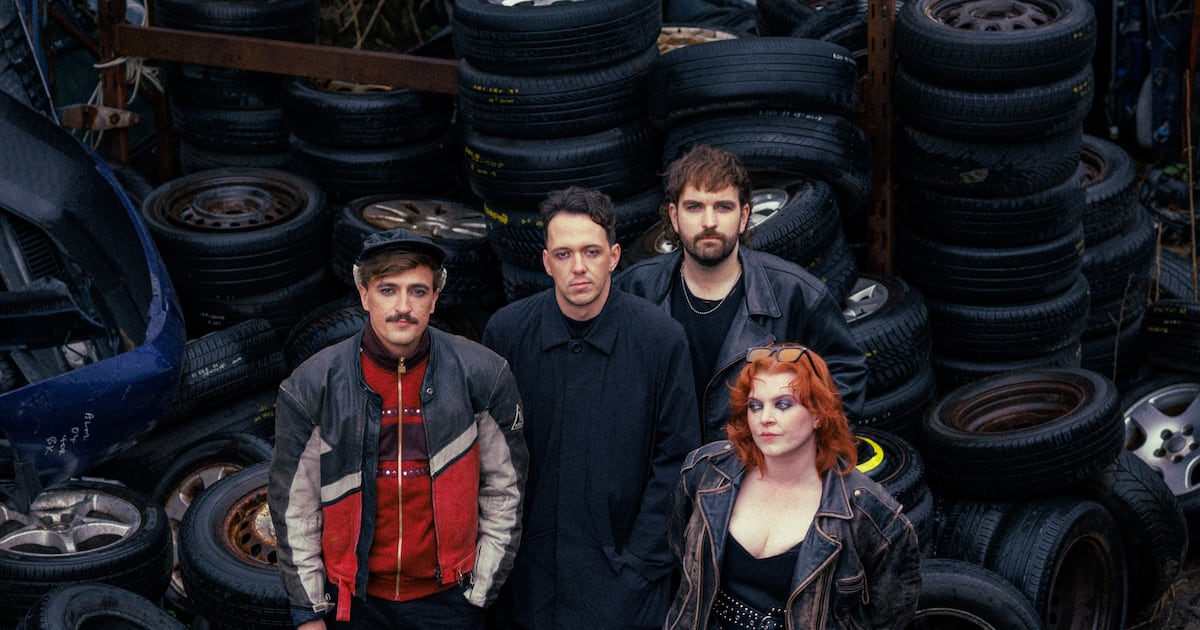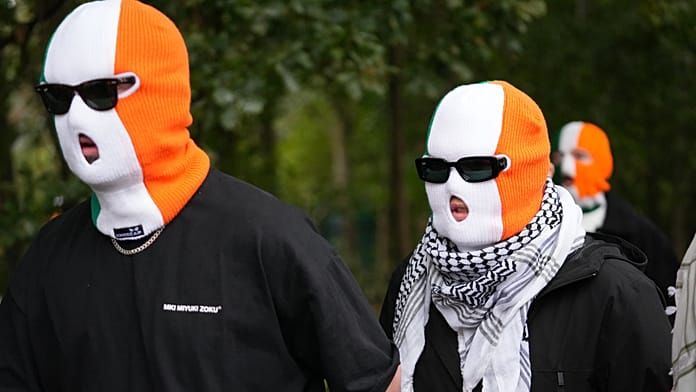All That Is Over
Artist: Sprints
Label: City Slang

Read more on post.

The Rolling Stones are in trouble with Spanish group Angelslang. The band’s frontman, Sergio García Fernández, has sued the veteran British rockers claiming they used two of his tracks to create their apocalyptic song ‘Living in a Ghost Town’, a single they released in 2020 during the COVID-19 pandemic.
Sergio García Fernández, an Argentinian musician based in Madrid, has filed the copyright infringement complaint in Madrid’s 19th Commercial Court which alleges that Mick Jagger and Keith Richards used elements of two songs by Angelslang.
‘Living in a Ghost Town’, a reggae-influenced blues-rock track accompanied by a pandemic-inspired video, reached number three on the Hot Rock & Alternative Songs chart in May 2020.
At the time of its release, Stones frontman Mick Jagger said: “The Stones were recording new material in the studio before the quarantine and there was one song that we thought had a special resonance given the circumstances we’re living in. We worked on it in isolation.” And here it is, it’s called ‘Living in Ghost Town’, I hope you like it”.
“We recorded the song a year ago in Los Angeles for our new album, a project we’re still working on, then the shit hit the fan and Mick and I decided that the song should be out now and here it is: ‘Living in a Ghost Town'”, added Keith Richards.
The case was originally filed in federal court in New Orleans when Sergio García Fernández’s lawyer’s pleaded: “The defendants never paid the plaintiff or obtained permission to use [the songs].”
However, the judge ruled that the Louisiana federal court lacked jurisdiction over Fernández’s case. He noted that Jagger and Richards are British, Fernández lives in Spain and the Rolling Stones “have only performed in New Orleans four times”.
Now, the lawsuit has been transferred to Madrid “following the express wish of their Satanic Majesties that the case be tried in Spain, as they alleged in their appeals to the New Orleans court, accepting in turn, the existence of similarities between the songs involved”, the composer explained to the Spanish daily ABC.
Fernández maintains that they “misappropriated many of the recognisable and key protected elements” of his 2006 song ‘So Sorry’, as well as his 2007 track ‘Seed of God’.
But how likely is it that the Stones were inspired by Angelslang’s songs? Were they fans of the Spanish band? Fernández allegedly sent a CD demo of the tracks to Mick’s brother Chris Jagger,** whom he met at a gig in Madrid in 2013.
Later, Chris reportedly wrote him an email expressing that his songs and style were a sound that “The Rolling Stones would be interested in using”, explains the plaintiff, who also has other emails in which Jagger and the Angelslang lyricist shared impressions of the song texts.
The Stones, one of the world’s most successful acts, have influenced countless musicians. But while it is true that the compositions of Fernández’s band and ‘Living in a Ghost Town’ are similar, it is very difficult to discern which came first: perhaps the Spaniards were inspired by their Satanic Majesties or vice-versa.
Fernández claims that there are a multitude of coincidences between his compositions and ‘Living in a Ghost Town’, mentioning similarities in vocal melody, chord progressions, percussion patterns, harmonica parts, tempo, etc. The Argentinean composer’s defence has provided an expert report by a musicologist which, according to them, shows that there has been “fragmented plagiarism”, that is, the copying of recognisable parts of Angelslang’s song.
Fernández suggests that “perhaps the Stones merged the two songs with AI, produced a hybrid and played over it”. A theory that seems to lack a strong basis,** because although artificial intelligence existed in 2020 , it was not as advanced as it is today and its use was experimental.
Fernández also claims to now have health problems after being hacked and harassed through social media networks. In response, Fernández adds that he has prepared a last will and testament in case something should happen to him during the process.

Read more on post.
Irish artists have a history of struggling with their second albums, whether that be U2’s anaemic and preachy October or Hozier’s trite Wasteland, Baby!, with its irritating exclamation mark.
Others have stumbled, too. Fontaines DC’s A Hero’s Death was among their least essential, and The Frank and Walters spent years wandering the indie wilderness before releasing Grand Parade (admittedly their best release – but did it have to take so long?).
None of which weighs even for an instant on the shoulders of the Dublin postpunk four-piece Sprints, who follow up last year’s spectacular Letter to Self with an irresistible wrecking ball of a sequel. All That Is Over is a courageous album that represents a sharp departure from their debut, a heavy-hitting affair but one front-loaded with melodies that functioned as sugar mixed in with the spice.
[ Sprints: Letter to Self – Confessional album deals with experiences of struggleOpens in new window ]
All That Is Over exorcises the sunshine and goes big and dark. The album is confrontational and compelling, and it cares not a fig for expectations. In an industry fuelled by hype, it dares to be confounding and to require active engagement from the listener.
All That Is Over doesn’t take you by the hand: many thrilling moments are scattered amid the gloom, but it asks you to seek them out for yourself rather than laying them out on a platter.
It is a record of ideas, above all. Assembled in France with Daniel Fox, of Gilla Band, as producer, the album is, according to the group, a reaction to the many traumas in the world today, whether Gaza or the transformation of the United States into a dystopian Magaland. There are so many horrors that we can take our pick.
Hard times call for harsh songs, or so Sprints have concluded. Where they came flying from the traps on Letter to Self, here the tunes unfold darkly and languorously. A stygian doom envelopes the opening track, Abandon, where guitars prowl and growl and the drums go off like depth charges before Karla Chubb takes the stage. “Abandon all hope, hang the rope,” she growls.
It’s a bleak line that sets the tone for an LP wreathed in a feeling of despair that curls and curdles like fog rolling in from the sea.
Heavy though it was, Letter to Self was also stuffed with bangers. Second time out, Sprints are self-consciously suppressing their talent for effervescent pop. In its place the band bring raw, unvarnished catharsis – on Need they sound like a hellish version of the indie crowd-pleasers Wet Leg, zipping guitar doing battle with Chubbs’s nail-gun delivery. “Won’t you tell me you love me? Won’t you tell me what’s wrong?” she shrieks.
Like sunshine after thunder, the mood mellows somewhat in the second half. On Pieces, Sprints deploy roiling Pixies riffs as Chubb unpacks personal drama in a half-spoken chant. “Help me, help me, I’m a mess / She’s left my mind in a state of undress.”
That Sprints can be as catchy as anything when the mood takes hold is confirmed on the penultimate track, Coming Alive, which features a beautiful avalanche of guitar and a vocal as addictive as anything Taylor Swift, Chubb’s musical hero, might come up with.
That throat-clearing is followed by the project taking its leave with the broiling, purgative Desire – the sound of an indie disco shaken and stirred by pile-driver riffs. “It’s the good, the bad … the best you ever had,” Chubb intones as the song goes thermonuclear. It’s an outpouring of unfiltered fury that roots the listener to the spot.
All That Is Over isn’t a straightforward affair. If you feel music should be a refuge from the outside world, you may find it needlessly cruel and punishing. But it’s an album brimming with big concepts about the strong imposing their views on the powerless, and its rage feels well judged and of the moment.
In this troubling age we need pushback and anger. Sprints provide both in knock-out quantities.

Read more on post.
6dm ,: >ރU5C*
0BXO”V(07idThI ![j�LiJS*3bи*˯kk%lIN ZWWu&i;lT(e-1=A8C;ϻk씱H1RJj?EJUDM64 *x|)fPaI
“;ĶGp 94s{/>҂پ]4n@d.I7iW(6XA%O
QR6J”v!(D?E%*m@j^:V1 ‰?(/)rS’Hcz4N?+}!_扻lsHeZIeX]f†Rm:_&FFLCerOwc(9)D%w
ʛhL|ʄbMm5hN
AYC[۞DI*e_?oC7{z8P-(?SB1%˼M`-w&]U_݇”7G
BBMB!hGuU/͝Mqe=
Y”⬟~MrLlqeY-8!ښ#/=R$R1I#,EVET”Gr|>o.c%UK@Kq;lռ>p:Z1aU6]ѫKCAzE]ad][jII[G{{Jz;Aꆎ{^%L݊Ob!4XYb`Ïp+OnNyk[G9MP3r’`6,X۹ޢTPמvT=a[m_L(mE
YI._>
M3`[|L1@`vx,qZ’d&@F7yaΏTB |FuslLgԳU})߮w 1)gI;zJa=-C3t(.ueIgz3=6Sz2Ɯ2sy~91CJAq”*ZLL͟C?4b0YTK)f8>`QecCeB}{*Gxne*}&51N8`#0/IzXhmOb6?3-VިMCa+.ǜRix4̨X+X7}Pm~Pg0r&]n8A#d`[[0{|Jǵ8C!q`V?ٸ
SbmPe$ h�&R{n]7&gI=>/caȖq4IJPϝ.(ׅHJyAgv^XGw`*{+=*TR
,5’&ߟRQj>=>JTYݒvtJ5i?IkEVOoU7Wa˥ƽ’LORC;]G}|tEDžH2^.
JyKMą3=
WdZfj!خ@e%r:FJ !nz^X%zLX$3Gzipw9YtBgLڡ4sӋ
7}}]cnCxf;1|[F˂AudiYb[In-lCM”eZWuMqd.g{rbJ*sܾ?,:*01_TIeDБΆ^x]:jIX,1-{v4E5IrLd”-Uβ՟}UUĥ[F:(om;
Pw!/(>Ҁ>-B/J’jÏWfIPY9y_^Dๆ=^Ab0~״XɢXQAy]-d5hoHbE[Hjى.Yzy88FS7 M!)?
l4p8*ɏ>(.Ujha!7 Bv3`(43Ѣax_{@@2`v+ae5C*DamSuBJow�IU彐(Nxvo4^rss
~~mLW7ovxݿ۰|&VS’;|Z[a^.w7QAz&kgnن%qøxxb;+]{o[‘nQ@5i֡;|Afqc?fѠRU?~’w$clPl(BOƀ
^�Jx1?2ߙ.oX
:!XYd
bvԳ?>4X&.”cx)Ru[dQ뭔(aSejj*U!؞?8EҶGC”=;yĄ5:�ӽ֪i;cm3Ym32 qHz
!ߟǸa>~26Zl}*v-
?Þ2b 2l�|!XG#߆UiC(>BUT9CU16|^~#A~;_GȐ{6i83
h|2k%Zr�0r:#“hpz¯,AˠːB�NMϹL8q0gZr$CYt6L-yV}b)sX>9a !^D0lZZDBhvi~q*oXO# Fvo;ONg}|x{f5|]5?5no/v{inwÓa1謤q2’YxM!U.5)’bpՂ+I>0P&*눡.aQ(*I_JUzMpm4K4&KIF#UOq>Dv31YR@tR5s{a}2J)U^xk4WC„.,Bja6(qHHɄu@cuX,(LaoP&! :c%7E!Zx0A6FuEk.mArh$;9UOt!JC|GRa@㖽R]M`Cp B’d^[-ۀ
lDpMS2MA:4p IԠj`Sj#։ 7iv]o1#š__|x{
Մa`/fI’חNE>AMaM6I(ijgEWmx{
+U|b?’=@l@$0R(yN ˿B]JAWrׯAy(%!A;{fk7H~)uHD5ED
e-ֆHѠ|Ix-GYL1GTNV(0F+ffO{[ FS ZMaIMEdA*2eDw~s窫ŠBVu^P megbb
Zi˭’ x8UUtڈs-bH'”=IIg^th/” &F1mَbBxP*fu%2Lp3/n”�$(ŵ]r[BEQM֕_[Aos}_kBSKawq@;I^x”[&/~Nr$9ϋ!4?vr
T3NRLJNjV”�d`kElf?’#$8Gj%ZEv+9HAI>h{T=y[2c}�6Oz$cAyx”ɻPn6Oz;c#a’7R}q6’0B1Tԅц�$@@Eb]fX`ˮ&):ͮ2$>d`G8H-?’NDچF~p{?}#vA”؞LΚ�-]#iF^,k(eUGw;p4:f-amnB7pqi
|}U!J5D OoTI>sˉ]K?)IHAV
uR[)e4!#T0fI’S6*D;a
}rhإAk477E”ƽ9b”-+䥃[wPPHġ^ɴ|K-3C uqPqVBzqt;TLvc}$’Xߑ!Vv@[9Kl,
mzgosļcS#’ B+y’adXĔ*k�fe{T”,Ej`;TۓsYeLp
,bHnنY”vE{Z.X[^s [�7hn% ?4Y@@۽n
X#{d}NolX`$(@~q0ᖚĈfH
ZOP{t
A`%j12AuCe>;Y=hiai,½Y#kop*hq?۲
;s]/+Ԋ’R`IG,jnYZ bSv1ح!AzjβC9B3 cbٺ?RMz2=’n/�O b[ɞ̓Y’dP./[NO5=’DMˆh-e8mOLlw K+6]t#uBgȽUN;�K:ҕ=CO
ehmpz’oU>k&[#^:qؓomP&p8:79V.Q%}TYA
2b’YkN4q-&
Z 31p4[d
@MOC)!|NjU>Zu].Bo�0Ȕ(a&L” zA,!4q=pq!hZ-@QF,5>uM3Q2O{=>z1CR9n[Zya-KonZkϓjA4g
rju, S{n1D+-asOOx6_=)鲇�2=bMA%(ŜCz?k+9rnxBk;3hFJ壧`[lVJaSS/pQneoV?Z�P7?nVb&Uߘ=f05/iN6Q:&’2PxN.Bf”/VOs2ؼ74zP2Xrc�E!mֺ �ڢ}Gf`jIҪTm {2#p7`xi
/Ov:i:
B 4QlVA’dFf4We6ûo^I5 o>|s}6Z”B*�~G4q免/bckY4;:$u:fkeoPg�jnLu1U+RB)`ܱZfk)!’zٚX( b&)n;{I ‘Ʉ iH;ukxM̨/Pa_:”̠7^#|C4,D}jVv.0~E=EѱF% &C~3
b$jTL)sIȭYXkSY2^H tS:J[:Rn*u_1fb5e`9ΐ3kTAwmuCғ-oje�’:ŝX6v҄۷$-1i^He
0aH3%8t_PVkI09k1$Ì9ue;/2dX2ZLSSYLxè;]CFk-I큤PdAo# )F6l$餍٦#%p”h!Zpg
:grn`UƑ_=19 ƴcz4G7WoYK
#w+KodD[d(~M EAnڣ{::moMyC2JZFJ=jFM=7=+Ư]m^,~M|QP-%DB9089epBJ/=Xk҂T�+Ai!e`RRlV`Y7Yo(L`2;{,1ʁNÁgw&XD:ܚX(edp>F HXaЂFas0i(A@AxZHቸZH5ūr2܅{W0ztAy+9 ;VHOڬ֑z1y+~I
X9+hI-fЂ:Ҡ -uP` %H1Z(8-‘- FH-uZam+`d%2Ty$+H’QAC1Ń͵i9(NEn;)[9ւ^5 G D/䪛͎c#f:v!I%pj+,Rhe=0w{4}n~R)$}R+ c8wvY$),CEpVӇYZ
%=apƁ`6}—-[+SOT;AU`*.TItի”},8
E=MCHf#>J8F0ކvR Xklx^C6s!otʬ9miT~&$7vpa=DaM2ՐYTT%*T-pDrtáD%y:eW3G|VI�6[&sgYD
9A;OtORVm ;Ǥ2g/}ȍ_Q2bfa{R1W}-)A
s
xx.”N2!k?/6
Lj@[VtwYdh0ed7-Ӌۏs1QTPb,y%G{# ixXCԇT6ZRʯ”(?_ #4(njK1˼% ^iwq�ّjHp@9Idtl1`/XK�mhG`tu03TT_$Yx0JDK6″=-y/ϰLjfuyӽvy??TU%Yc=
3l”R|Dnh+K]J/v$0’1ku,Ov{W*s!jMPq8NxU ;hިqۤKT[Z
`χyBtDv;Hj.Om_RRWpӷ iuybuaOx�=Ns)9O’t@1ml3Ҩ%DҊ)ڒ{G[fz
[VToJ[j”8
_.9+c@>jHȇi[Bٍ!?,RV
“0^i vwDRRCQƥ#Ym|,P}
*jԊ2tƯKQ)X�-rłjO5$;Fme4їu
(`W&8v}]×!z8Z&UYm>’�=”�21ڄ”uVa+֩7o
v9(e#[q~c]=:!L
R3ZpJ#{eޕ&b_?iC갏qP`_.N!GF+AJiߴVVccbK>2 Dsb%,&Yj^cHTrj(ݽ̡3Y@B|a
O[o4rNC]wxf. “`s OTF]?r>4Pbŕ)Zss=V2uXS]”N9┴/Z뀻1ǪDŽO4!2[
-4%:iׄ kb5PSiS|*cqҝ)Ŷ8ܪY2CsSnV’f彚&#rn5t�a,nrYQ5(MBQDܚ;JL.
DWi]Y%@2מp0
V?A,,y_E4K*3#CDXng}@{LCQ0$hh*wMq%E|=/J9cBije-tUxoE3綶#lpO)O/ܪ8*!#~OZN`=?C$Aogn]g0 8_Wd,ɲ|w2pH}�Ý21US]K|Ek7�b5Z
,z_A2[I
g~֢O/LmPw)SR#>10mzɏ

Read more on post.
Scottish singer-songwriter Lewis Capaldi is undertaking his first UK and Ireland tour after taking a two-year break to focus on his mental health.
The tour, which kicked off on September 7th in Sheffield, includes two concerts in Ireland.
It comes after Capaldi made a triumphant return to the spotlight in June earlier this year when he played a surprise set at Glastonbury.
“Second time’s a charm on this one, I just wanted to come and finish what I couldn’t finish last time,” Capaldi told the Glastonbury crowd, referring to his set at the festival two years previous when he struggled to perform due to Tourette syndrome.
The Someone You Loved singer described his decision to step away from the spotlight as a way to “release the pressure valve”. He acknowledged that the stresses of his sudden fame, his diagnoses with Tourette syndrome in 2022 and his anxiety made performing nearly impossible.
With his return Capaldi has released two new singles from his upcoming album, Survive and Something in the Heavens.
Are you heading to one of his Irish gigs? Here is everything you need to know.
Capaldi will perform two concerts at Dublin’s 3Arena on September 29th and 30th.
Doors open at 6.30pm with support acts expected to start near 7pm. Capaldi will take to the stage at about 8.45pm. His set is about one hour and 25 minutes long, so the concert should end some time close to 10.15pm. Traffic and entry delays are inevitable, so make sure you give yourself a couple of hours’ leeway getting to and from the venue.
Singer-songwriter Skye Newman and Dublin-based musician Aaron Rowe will warm up the crowd. Rowe came to Capaldi’s attention last year when he was at a friend’s stag do in Dublin and saw Rowe perform in a pub. The pair crossed paths a few weeks later at an open mic night in Nashville in the US where Capaldi introduced Rowe to his now manager.
Below is a set list performed by Capaldi at in London on September 18th – it might give an idea of what to expect in Dublin.
The venue is located by the Point Village on Dublin’s northside, so concertgoers are advised to use one of many public transport options to get there.
The closest stop to the venue is Castleforbes Road which is a two-minute walk away and which the 151 Dublin Bus route stops at. It operates every 10 minutes during rush hour. The G1, G2 and N4 bus routes all have stops within a 10-minute walk from the venue.
Parking is available in the Point Village car park but spaces are limited. With large numbers gathering on show nights, traffic congestion can delay your arrival and departure so leave lots of time.
The Luas Red Line stops at Connolly Station which is about a 25-minute walk from the venue. You can switch from the Green Line to the Red Line in the city centre.
If you are coming into Connolly or Heuston station there are Luas or bus connections to the 3Arena.
Tickets are sold out on Ticketmaster for both nights. However it is possible that some verified resale tickets may become available.
Remember to download tickets to your phone in advance, as there may be internet or connectivity issues at the venue.
Do not rely on screenshots, as Ticketmaster often use live or dynamic barcodes that update regularly.
Under-16s will require an accompanying adult aged 18 or over for any ticket type and the standing areas are strictly over-14s only. Make sure to bring an official form of identification with you such as a passport, Garda age card or driving licence.
Bags size A4 or more will not be permitted entry, and all bags will be subject to a search on arrival. Prohibited items include glass, cans, alcohol, garden furniture, umbrellas, flares, illegal substances or any item that could be used as a weapon.
Recording and taking pictures using a camera phone is no problem, but professional recording equipment will not be allowed inside the venue.
European Parliament snubs Orbán with vote to shield Italian MEP from Hungarian arrest


Life, loss, fame & family – the IFI Documentary Festival in focus
EU renews support for WHO’s Universal Health Coverage Partnership


Key oceans treaty crosses threshold to come into force


Fatal, flashy and indecent – the movies of Adrian Lyne revisited


Twilight at 20: the many afterlives of Stephenie Meyer’s vampires


Farewell, Sundance – how Robert Redford changed cinema forever


What is KPop Demon Hunters, and why is everyone talking about it?